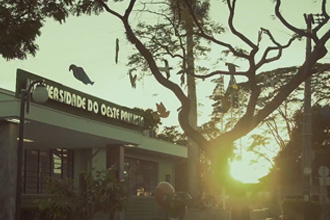Graduate Program in Animal Science
INTRODUCTION
The Graduate Program in Animal Science (PPGCA) at Unoeste was established in response to regional research needs and the academic development of its faculty. Rooted in the Veterinary Medicine course, which began in 1987, the program benefited from institutional support that encouraged faculty members to pursue advanced degrees (Master’s, Ph.D., and Postdoctoral studies) at top Brazilian universities. This strategic investment led to the creation of the Master’s program, approved by CAPES in 2005, with its first cohort beginning in 2006. Continued academic growth and strong research output enabled the launch of the Doctoral program in Animal Pathophysiology and Health in 2015, also recommended by CAPES with a score of 4. Since then, the program has maintained high academic standards, regional impact, and a commitment to excellence in graduate education and scientific research.
Faculty Profile: The faculty of the Graduate Program in Animal Science (PPGCA) has a diverse and multidisciplinary academic background, including fields such as Veterinary Medicine, Human Medicine, Biology, Biomedical Sciences, Physiotherapy, and Animal Science. This variety of training and expertise enables an interdisciplinary and transdisciplinary approach, strengthening the program’s three research areas.
Area of concentration: Animal Physiopathology

RESEARCH LINES
I - MEDICAL CLINIC AND ONE HEALTHY
Overview: Development of studies with emphasis on the control of the main parasitic, infectious and zoonotic diseases that affect domestic animals. Also, development of experimental studies in laboratory animals, as well as clinical studies that evaluate the development of therapeutic behaviors and new technologies that can be applied in the different areas.
Related Faculty:
- Cecília Laposy Santarém
- Rogério Giuffrida
- Rosa Maria Barili Nogueira
- Silvia Maria Caldeira Franco Andrade
- Vamilton Alvares Santarém
II- NUTRITION AND REPRODUCTION
Overview: Development of projects with emphasis on studies nutrition and animal production.
Related Faculty:
- Anthony César de Souza Castilho
- Calie Castilho Silvestre
- Hermann Bremmer Neto
- Ines Cristina Giometti
- Leonardo Oliveira Mendes
- Marilice Zundt
- Lizziane Kretli Winkelstroter Eller
III- CELLULAR AND TISSUE AGGRESSION
Overview: Development of projects with emphasis on studies involving tissue and cellular aggression.
Related Faculty:
- Cecília Laposy Santarém
- Francis Lopes Pacagnelli
- Gisele Alborghetti Nai
- Leonardo Oliveira Mendes
- Rafael Stuani Floriano
- Rosa Maria Barili Nogueira
FACULTY´S EMAIL AND RÉSUMÉ
- Anthony César de Souza Castilho (anthony@unoeste.br) (orcid.org/0000-0003-1666-7021)
- Caliê Castilho (calie@unoeste.br) (orcid.org/0000-0003-3300-8116)
- Cecília Laposy Santarém (claposy@unoeste.br) (orcid.org/0000-0002-4775-6142)
- Francis Lopes Pacagnelli (francispacagnelli@unoeste.br) (orcid.org/0000-0003-3712-5854)
- Giseli Alborghetti Nai (patologia@unoeste.br) (orcid.org/0000-0003-1674-7371)
- Hermann Bremer Neto (hermann@unoeste.br) (orcid.org/0000-0001-9592-8896)
- Ines Cristina Giometti (inesgiometti@unoeste.br) (orcid.org/0000-0001-8621-8374)
- Leonardo de Oliveira Mendes (leonardo@unoeste.br) (orcid.org/0000-0001-9761-7653)
- Lizziane Kretli Winkelstroter Eller (lizziane@unoeste.br) (orcid.org/0000-0001-9352-2630)
- Rafael Stuani Floriano (rafael@unoeste.br) (orcid.org/0000-0003-0759-5863)
- Rosa Maria Barilli Nogueira (rosa@unoeste.br) (orcid.org/0000-0002-1835-7812)
- Rogério Giuffrida (rgiuffrida@unoeste.br) (orcid.org/0000-0002-2380-4349)
- Marilice Zundt Astholphi (mari@unoeste.br) (orcid.org/0000-0001-9551-9195)
- Silvia Maria Franco Andrade (silviafranco@unoeste.br) (orcid.org/0000-0002-2284-5288)
- Vamilton Alvares Santarém (vamilton@unoeste.br) (orcid.org/0000-0002-7065-1138)
CURRICULAR STRUCTURE AND COURSES
The curriculum of the Graduate Program in Animal Science (PPGCA) was designed in accordance with the guidelines provided by the Veterinary Medicine Evaluation Committee of CAPES and aligned with the program’s research areas.
Master’s Degree
Core Courses
- Seminars – 2 credits
- Applied Biostatistics for Research I – 2 credits
- Research Methodology I – 2 credits
- Innovation and Entrepreneurship: State of the Art, Trends, and Hybrid Organizations – 2 credits
Elective Courses
- Clinical Medicine and One Health: Human, Animal, and Environmental Health - 3 credits
- Basic Education - 3 credits
- Cardiovascular Rehabilitation: Comparative Animal Experimental Models - 1 credit
- Advanced Topics in Cardiac Electrophysiology - 2 credits
- Comparative Ophthalmology - 3 credits
- Laboratory Techniques Applied to Human and Animal Health - 3 credits
- Cellular and Tissue Injury: Remediators and Indicators of Toxicological Pathophysiology - 2 credits
- Tumor Biology - 2 credits
- Bioengineering and Tissue Repair - 2 credits
- Nutrition and Reproduction: Molecular and Reproductive Techniques in Research - 2 credits
- Reproductive Biology - 3 credits
Credit Requirements:A minimum of 40 credit units is required to complete the Master’s degree. Out of these, 20 credits must be obtained from core, specific domain, and related domain courses, and 10 credits must be earned through complementary activities.
Doctorate Degree
Core Courses
- Seminars – 2 credits
- Applied Biostatistics for Research II – 2 credits
- Research Methodology II – 30 hours
- Innovation and Entrepreneurship: State of the Art, Trends, and Hybrid Organizations – 2 credits
Elective Courses
- Clinical Medicine and One Health: Human, Animal, and Environmental Health - 3 credits
- Basic Education - 3 credits
- Cardiovascular Rehabilitation: Comparative Animal Experimental Models - 1 credit
- Advanced Topics in Cardiac Electrophysiology - 2 credits
- Comparative Ophthalmology - 3 credits
- Laboratory Techniques Applied to Human and Animal Health - 3 credits
- Cellular and Tissue Injury: Remediators and Indicators of Toxicological Pathophysiology - 2 credits
- Tumor Biology - 2 credits
- Bioengineering and Tissue Repair - 2 credits
- Nutrition and Reproduction: Molecular and Reproductive Techniques in Research - 2 credits
- Reproductive Biology - 3 credits
Credit Requirements:A minimum of 65 credit units is required to complete the Doctorate degree. Out of these, 30 credits must be obtained from core, specific domain, and related domain courses, and 15 credits from complementary activities.
Complementary Courses – Special Topics
The Special Topics courses in the PPGCA play a key role in the advanced training of graduate students. They offer curricular flexibility, enabling the inclusion of contemporary themes aligned with current research demands and sectoral challenges. These courses also promote interaction with guest experts, foster scientific innovation, and encourage critical thinking. As a result, they contribute to a modern, market-responsive academic and professional education.
Teaching Internship (PED)
The Teaching Internship Program (Programa de Estágio em Docência – PED) within the PPGCA Doctoral curriculum complies with CAPES Ordinance No. 181/2012 and Brazilian Law No. 11.788/2008. The program aims to enhance the academic training of doctoral students by developing pedagogical skills and improving their professional qualifications. During the internship, doctoral candidates participate in undergraduate teaching activities under faculty supervision. These activities include preparing teaching materials, lesson planning, and conducting seminars. Participation in PED is mandatory for students receiving CAPES/PROSUP scholarships and can be carried out at Unoeste or other partner higher education institutions.
RESEARCH GROUPS AND CENTERS
- Biotechnologies Applied to the Reproduction of Domestic Animals
- Applied Clinical Pathology
- Tropical Parasitic Zoonoses in Domestic Animals and Their Agents
- Centre for Research on Toxinology
- Prostate Cancer: Histopathological and Molecular Aspects
- Endocrine Disruptors: Action in the Prostatic Microenvironment
- Intraocular Pressure Study in Domestic Animals
- Alpha-2 Adrenergic Agonists and Antagonists
- Study of Antineoplastic Protocols in Veterinary Medicine
- Tropical Parasitic Zoonoses in Domestic Animals and Their Agents
- Bacterial Diseases and Tropical Zoonoses in Production and Companion Animals
- Tropical Zoonoses
MAIN RESEARCH PROJECTS
- Zoonoses and Integrated Epidemiology (One Health): Includes surveillance, control of infectious diseases, and an intersectoral approach to human, animal, and environmental health.
- Toxicology and Exposure to Environmental Agents: Studies on venoms, pesticides, endocrine disruptors, and the impact of pollution on public health.
- Applied Nutrition for Reproduction and Zootechnical Performance: Additives, supplementation, strategic feeding, and their effects on productive and reproductive indices.
- Sustainability in Animal Production: Evaluation of by-products, cost-effectiveness, and environmental impact with an emphasis on carbon and agroecology.
- Reproductive Biotechnology: Production, manipulation, and evaluation of embryos using advanced techniques.
- Reproductive Toxicology and Hormonal Regulation: Effects of exogenous agents on oocyte competence, gene expression, and reproductive health.
- Tissue Repair and Biomaterials: Studies involving plasma, burns, wound healing, and regenerative therapies with a morpho functional basis.
- Cellular and Molecular Pathophysiology: Mechanisms of tissue injury, inflammation, and cardiac and muscular remodeling in experimental models.
- Innovative Technologies in Health and Diagnostics: Development of simulators, therapeutic protocols, and diagnostic methods applicable to clinical practice.
- University Extension and Applied Scientific Education: Projects focused on student training, scientific dissemination, and community engagement.
ADMISSIONS
Candidates may submit an application or fill out a prospective form online for further contact from the University.
POST DOCTORAL POSITIONS
The Graduate Program in Animal Science receives Ph.D. professionals for postdoctoral internships. Applications should include a proposal containing: a pre-research project, a personal statement describing the applicant’s interest in the Animal Physiopathology studies and career goals and a letter of recommendation from the researcher’s primary faculty advisor. The application should also indicate who would be the researcher’s program advisor, who must be a member of the program faculty.
Please submit your application or proposal to the addresses listed at the "CONTACT US" section.
VISITOR INFORMATION AND STUDENT LIFE
Founded in 1972, the University of Western São Paulo – UNOESTE is committed to building character, modeling values, and ensuring that students graduate with not only hands-on experience in their field of study, but also with the necessary life skills to be successful. Rooted in the major areas of knowledge, UNOESTE is a private comprehensive institution with around 18,000 undergraduate and graduate students. Its mission is to provide educational experiences that enlighten, challenge, and prepare students to lead lives of significance in complex global communities, being recognized for the excellence of its academic programs, the depth of its values-based culture, and the breadth of its inclusiveness.
The city of Presidente Prudente is located in the western region of São Paulo State, and is recognized as presenting one of the highest HDI values in Brazil. In this city, every citizen receives extraordinary opportunities for high level education in an inspiring environment. Although it is a modern and cosmopolitan city, it still maintains many aspects of a small inner city, where people are welcoming, willing to dialogue and mutual understanding, under excellent levels of public safety. In addition, the city has a recognized high cultural level, with theaters, cinemas, artistic and musical presentations, as well as excellent facilities for daily activities, such as an efficient transportation system, and a wide availability of department stores, shopping malls, recreational clubs, gardens and public parks.
Our responsibility is to help prepare students with the knowledge of how to live at the highest of their potential. As a member of our university community, we want you to know that we are committed to making your experience the best it can be.
CONTACT US
For more information, please contact:
Program coordination
Anthony César de Souza Castilho (anthony@unoeste.br) (orcid.org/0000-0003-1666-7021) - Coordinator
Cecília Laposy Santarém (claposy@unoeste.br) (orcid.org/0000-0002-4775-6142) - Vice-Coordinator
International Cooperation Office (ICO)
Email: iaa@unoeste.br
Tel: +55 18 3229-3288
Fax: +55 18 3229-2080
Secretary - Graduate Program in Animal Science
E-mail: cienciaanimal@unoeste.br or keid@unoeste.br
Tel: +55 18 3229-3264
Tel: +55 18 3229-2000 Internal extension: 2131
At.
Dean of Research and Graduate Studies
University of Western São Paulo – UNOESTE - Campus II
Rodovia Raposo Tavares, km 572
CEP 19.067-175 Presidente Prudente (SP)
BRAZIL








